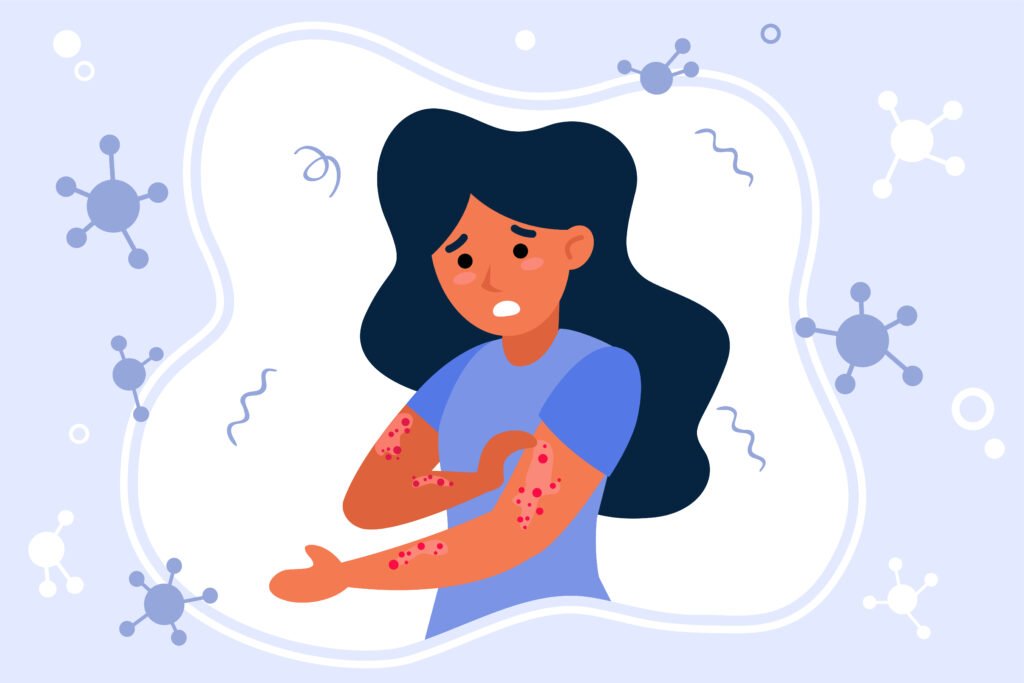
Eczema, a chronic skin condition characterized by inflammation, itching, and redness, can significantly impact one’s quality of life.
While conventional treatments may provide temporary relief, an increasing number of individuals are turning to holistic approaches like Ayurveda for a more sustainable solution. Ayurveda, an ancient Indian system of medicine, focuses on balancing the body, mind, and spirit.
In this blog, we will explore how Ayurveda addresses eczema, incorporating traditional wisdom and herbal remedies.
Eczema and its link to an imbalance
- Dosha Imbalance: Ayurveda identifies three doshas – Vata, Pitta, and Kapha. Eczema is often associated with an imbalance in Pitta dosha, leading to excess heat in the body.
- Agni (Digestive Fire): According to Ayurveda, impaired digestion can contribute to skin disorders. Restoring Agni through dietary modifications is a key aspect of eczema management.
- Detoxification: Ayurvedic treatments focus on detoxifying the body to eliminate accumulated toxins that may manifest as skin issues. Panchakarma, a set of cleansing procedures, is commonly recommended.
Ayurvedic Herbs for Treatment
- Neem (Azadirachta indica): Neem is renowned for its anti-inflammatory and antimicrobial properties. Ayurvedic practitioners often recommend neem-based formulations for topical application and internal use.
- Turmeric (Curcuma longa): Curcumin, the active compound in turmeric, exhibits potent anti-inflammatory effects. Ayurveda harnesses turmeric’s healing properties to alleviate eczema symptoms.
- Aloe Vera: Known for its cooling and soothing properties, Aloe Vera is frequently used in Ayurvedic preparations to relieve itching and inflammation associated with eczema.
Ayurvedic Lifestyle Practices for Eczema Management
- Balancing Stress: Ayurveda emphasizes the mind-body connection. Stress is considered a trigger for eczema flare-ups, and techniques like meditation and yoga are recommended to manage stress levels.
- Choosing Seasonal Foods: Ayurveda recognizes the impact of seasons on health. Individuals with eczema are advised to consume foods that balance their dosha and are suitable for the prevailing season.
- Optimizing Sleep: Quality sleep is crucial for skin healing. Ayurvedic practices promote a bedtime routine and lifestyle adjustments to ensure restful sleep, aiding in eczema management.
Summary:
In conclusion, Ayurveda provides a holistic and personalized approach to treating eczema by addressing the root causes and promoting overall well-being.
Through dosha balancing, herbal remedies, and lifestyle adjustments, individuals can experience long-lasting relief from eczema symptoms. Incorporating Ayurvedic practices into one’s daily routine not only treats eczema but also enhances the overall health of the skin and body.
It’s essential to consult with a qualified Ayurvedic practitioner to create a customized plan that suits individual needs and conditions. If you suspect you have any severe inflammation or a related skin condition, it’s advisable to consult with a healthcare professional or dermatologist for an accurate diagnosis and appropriate management and use Ayurveda as an integrative medicine.
References and Attribution:
It is recommended that readers explore these sources for a deeper understanding and validation of the concepts discussed
Ayurvedic Texts:
- Charaka Samhita: The ancient Ayurvedic text that outlines principles of doshas, Agni, and holistic health.
- Sushruta Samhita: A foundational Ayurvedic text focusing on surgical procedures and broader healthcare practices.
- Ashtanga Hridaya: A comprehensive Ayurvedic text that synthesizes principles from Charaka and Sushruta Samhitas.
Scientific Literature:
- Williams, H., & Flohr, C. (2006). How epidemiology has challenged 3 prevailing concepts about atopic dermatitis. Journal of Allergy and Clinical Immunology, 118(1), 209-213.
- Surjushe, A., Vasani, R., & Saple, D. G. (2008). Aloe Vera: A short review. Indian Journal of Dermatology, 53(4), 163–166.
- Hewlings, S. J., & Kalman, D. S. (2017). Curcumin: A review of its effects on human health. Foods, 6(10), 92.
- Tiwari, R., Chakraborty, S., & Saminathan, M. (2019). Neem (Azadirachta indica): An Indian traditional panacea with modern molecular basis. Phytomedicine, 59, 152907.
- Patwardhan, B., & Mashelkar, R. A. (2009). Traditional medicine-inspired approaches to drug discovery: Can Ayurveda show the way forward? Drug Discovery Today, 14(15-16), 804-811.
- Langley, R. G., Krueger, G. G., & Griffiths, C. E. (2005). Psoriasis: epidemiology, clinical features, and quality of life. Annals of the Rheumatic Diseases, 64(suppl 2), ii18–ii23.
Website Design and Prompt Concept by Tridoshic-AI @2024
Generated by ChatGPT by OpenAI
